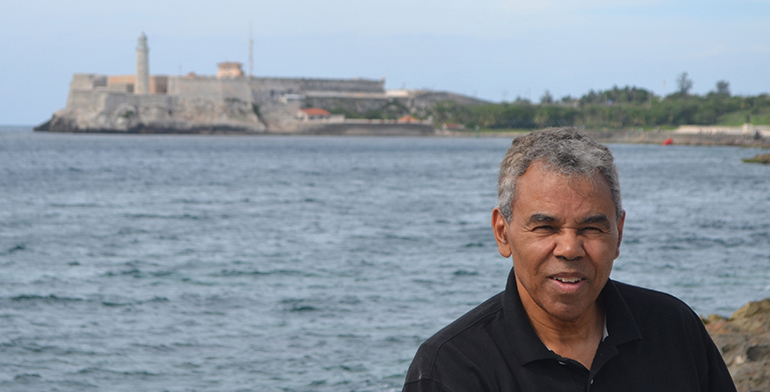Posted 8:03 p.m. Wednesday, Oct. 3, 2012

This week's news and events.
 [/caption]
Story by UW-L students Melissa Moss and Spencer Hoostal
UW-L Geography and Earth Science Professor Georges Cravins’ summer trip to Cuba did more than just increase his knowledge of the country. He’s gained information that will enhance his students’ classroom experience. He also made contact with other geographers in Cuba that will allow him to establish permanent ties to the island, and to conduct additional research related to his work at UW-L. Cravins made new discoveries while in the country with his fellow geographer and friend, William Rosas of Tampa, by meeting with students, business owners, workers, artists, doctors and geography professors, which all aided him in new discoveries.
Until recently, the U.S. government’s 1960 embargo of Cuba had prevented other geographers from making this trip, limiting communication between U.S. and Cuban universities. The embargo was put in place because of Cuba’s alignment with the Soviet Union during the Cold War. All U.S. tourists were banned from visiting Cuba, but since the embargo’s limits were loosened by the U.S. government in 2011, exceptions have been made for individuals meeting certain requirements. Cravins was told that UW-L is only the second university to establish contact with the University of Havana. The University of Alabama-Tuscaloosa was the first.
Many factors make Cuba a good candidate for exploratory field trips and Cravins is excited about additional visits. He can envision many possibilities for UW-La Crosse, including:
[/caption]
Story by UW-L students Melissa Moss and Spencer Hoostal
UW-L Geography and Earth Science Professor Georges Cravins’ summer trip to Cuba did more than just increase his knowledge of the country. He’s gained information that will enhance his students’ classroom experience. He also made contact with other geographers in Cuba that will allow him to establish permanent ties to the island, and to conduct additional research related to his work at UW-L. Cravins made new discoveries while in the country with his fellow geographer and friend, William Rosas of Tampa, by meeting with students, business owners, workers, artists, doctors and geography professors, which all aided him in new discoveries.
Until recently, the U.S. government’s 1960 embargo of Cuba had prevented other geographers from making this trip, limiting communication between U.S. and Cuban universities. The embargo was put in place because of Cuba’s alignment with the Soviet Union during the Cold War. All U.S. tourists were banned from visiting Cuba, but since the embargo’s limits were loosened by the U.S. government in 2011, exceptions have been made for individuals meeting certain requirements. Cravins was told that UW-L is only the second university to establish contact with the University of Havana. The University of Alabama-Tuscaloosa was the first.
Many factors make Cuba a good candidate for exploratory field trips and Cravins is excited about additional visits. He can envision many possibilities for UW-La Crosse, including:
- Exploring ties with faculty at the University of Havana;
- Making an effort to understand Cuba’s successes in hurricane evacuation, medical education, poverty reduction, organic and sustainable agriculture, and adult education and adult literacy programs;
- Exposing UW-L’s faculty and students to Cuba’s climate and its varied topography;
- Increasing public awareness of Cuba’s major role in global and Latin American politics and in the development of modern Latin American music.
